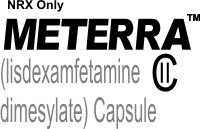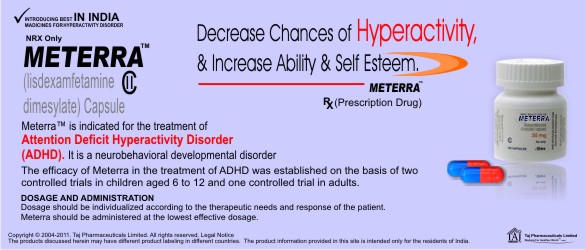Generic Medicines
Taj Pharma is the largest generic pharmaceutical company in India. We hold top positions in different established markets worldwide generics markets..

DRUG DESCRIPTION : Meterra is designed as a capsule for once-a-day oral administration.Meterra capsules contain 20 mg, 30 mg, 40 mg, 50 mg, 60 mg, and 70 mg of lisdexamfetamine dimesylate and the following inactive ingredients: microcrystalline cellulose, croscarmellose sodium, and magnesium stearate.
INDICATIONS : Attention Deficit Hyperactivity Disorder
Meterra™ is indicated for the treatment of Attention Deficit Hyperactivity Disorder (ADHD).
The efficacy of Meterra in the treatment of ADHD was established on the basis of two controlled trials in children aged 6 to 12 and one controlled trial in adults.
A diagnosis of Attention Deficit Hyperactivity Disorder (ADHD; DSM-IV®) implies the presence of hyperactive-impulsive and/or inattentive symptoms that cause impairment and were present before the age of 7 years. The symptoms must cause clinically significant impairment, e.g. in social, academic, or occupational functioning, and be present in two or more settings, e.g. school (or work) and at home. The symptoms must not be better accounted for by another mental disorder. For the Inattentive Type, at least 6 of the following symptoms must have persisted for at least 6 months: lack of attention to details/careless mistakes; lack of sustained attention; poor listener; failure to follow through on tasks; poor organization; avoids tasks requiring sustained mental effort; loses things; easily distracted; forgetful. For the Hyperactive-Impulsive Type, at least 6 of the following symptoms (or adult equivalent symptoms) must have persisted for at least 6 months: fidgeting/squirming; leaving seat; inappropriate running/climbing; difficulty with quiet activities; “on the go”; excessive talking; blurting answers; can't wait turn; intrusive. The Combined Type requires both inattentive and hyperactive-impulsive criteria to be met.
Special Diagnostic Considerations : Specific etiology of this syndrome is unknown, and there is no single diagnostic test. Adequate diagnosis requires the use not only of medical but also of special psychological, educational, and social resources. Learning may or may not be impaired. The diagnosis must be based upon a complete history and evaluation of the patient and not solely on the presence of the required number of DSM-IV characteristics.
Need for Comprehensive Treatment Program : Meterra is indicated as an integral part of a total treatment program for ADHD that may include other measures (psychological, educational, social) for patients with this syndrome. Drug treatment may not be indicated for all patients with this syndrome. Stimulants are not intended for use in patients who exhibit symptoms secondary to environmental factors and/or other primary psychiatric disorders, including psychosis. Appropriate educational/vocational placement is essential and psychosocial intervention is often helpful. When remedial measures alone are insufficient, the decision to prescribe stimulant medication will depend upon the physician's assessment of the chronicity and severity of the patient's symptoms and on the level of functional impairment.
Long-Term Use : The effectiveness of Meterra for long-term use, i.e., for more than 4 weeks, has not been systematically evaluated in controlled trials. Therefore, the physician who elects to use Meterra for extended periods should periodically re-evaluate the long-term usefulness of the drug for the individual patient.

Meterra™ Capsules (Lisdexamfetamine
DOSAGE AND ADMINISTRATION : Dosage should be individualized according to the therapeutic needs and response of the patient. Meterra should be administered at the lowest effective dosage.
In children 6 to12 years of age or adults who are either starting treatment for the first time or switching from another medication, 30 mg once daily in the morning is the recommended dose. If the decision is made in the judgment of the clinician to increase the dose beyond 30 mg/day, daily dosage may be adjusted in increments of 10 mg or 20 mg at approximately weekly intervals. The maximum recommended dose is 70 mg/day; doses greater than 70 mg/day of Meterra have not been studied. Amphetamines are not recommended for children under 3 years of age. Meterra has not been studied in children under 6 years of age or over 12 years of age.
Meterra should be taken in the morning. Afternoon doses should be avoided because of the potential for insomnia.
Meterra may be taken with or without food.SIDE EFFECTS : Weight Loss – In the controlled adult trial, mean weight loss after 4 weeks of therapy was 2.8 lbs, 3.1 lbs, and 4.3 lbs, for patients receiving final doses of 30 mg, 50 mg, and 70 mg of Meterra, respectively, compared to a mean weight gain of 0.5 lbs for patients receiving placebo.
Cardiac Disorders – palpitation
Eye Disorders – vision blurred, mydriasis, diplopia
Immune System Disorders – hypersensitivity
Nervous System Disorders – seizure, dyskinesia
Psychiatric Disorder – psychotic episodes, mania, hallucination, depression, aggression, dysphoria, euphoria, logorrhea
Skin and Subcutaneous Tissue Disorder – angioedema, urticaria Adverse Reactions Associated with the Use of Amphetamine
Cardiovascular : Palpitations, tachycardia, elevation of blood pressure, sudden death, myocardial infarction. There have been isolated reports of cardiomyopathy associated with chronic amphetamine use.
Central Nervous System : Psychotic episodes at recommended doses, overstimulation, restlessness, dizziness, insomnia, euphoria, dyskinesia, dysphoria, depression, tremor, headache, exacerbation of motor and phonic tics and Tourette's syndrome, seizures, stroke.
Gastrointestinal : Dryness of the mouth, unpleasant taste, diarrhea, constipation, other gastrointestinal disturbances.
Allergic : Urticaria, rashes, and hypersensitivity reactions, including angioedema and anaphylaxis. Serious skin reactions, including Stevens-Johnson Syndrome and Toxic Epidermal Necrolysis have been reported.
Endocrine : Impotence, changes in libido.
WARNINGS
Serious Cardiovascular Events
Sudden Death and Pre-existing Structural Cardiac Abnormalities or Other Serious Heart Problems
Children and Adolescents
Sudden death has been reported in association with CNS stimulant treatment at usual doses in children and adolescents with structural cardiac abnormalities or other serious heart problems. Although some serious heart problems alone carry an increased risk of sudden death, stimulant products generally should not be used in children or adolescents with known serious structural cardiac abnormalities, cardiomyopathy, serious heart rhythm abnormalities, or other serious cardiac problems that may place them at increased vulnerability to the sympathomimetic effects of a stimulant drug [see CONTRAINDICATIONS].
Adults
Sudden death, stroke, and myocardial infarction have been reported in adults taking stimulant drugs at usual doses for ADHD. Although the role of stimulants in these adult cases is unknown, adults have a greater likelihood than children of having serious structural cardiac abnormalities, cardiomyopathy, serious heart rhythm abnormalities, coronary artery disease, or other serious cardiac problems. Adults with such abnormalities should also generally not be treated with stimulant drugs [see CONTRAINDICATIONS].
CONTRAINDICATIONS
* Advanced arteriosclerosis, symptomatic cardiovascular disease, moderate to severe hypertension, hyperthyroidism, known hypersensitivity or idiosyncratic reaction to sympathomimetic amines, glaucoma
* Agitated states
* Patients with a history of drug abuse
* During or within 14 days following the administration of monoamine oxidase inhibitors (hypertensive crises may result)
Presentation
Meterra Capsules Blister of 10 Capsules
